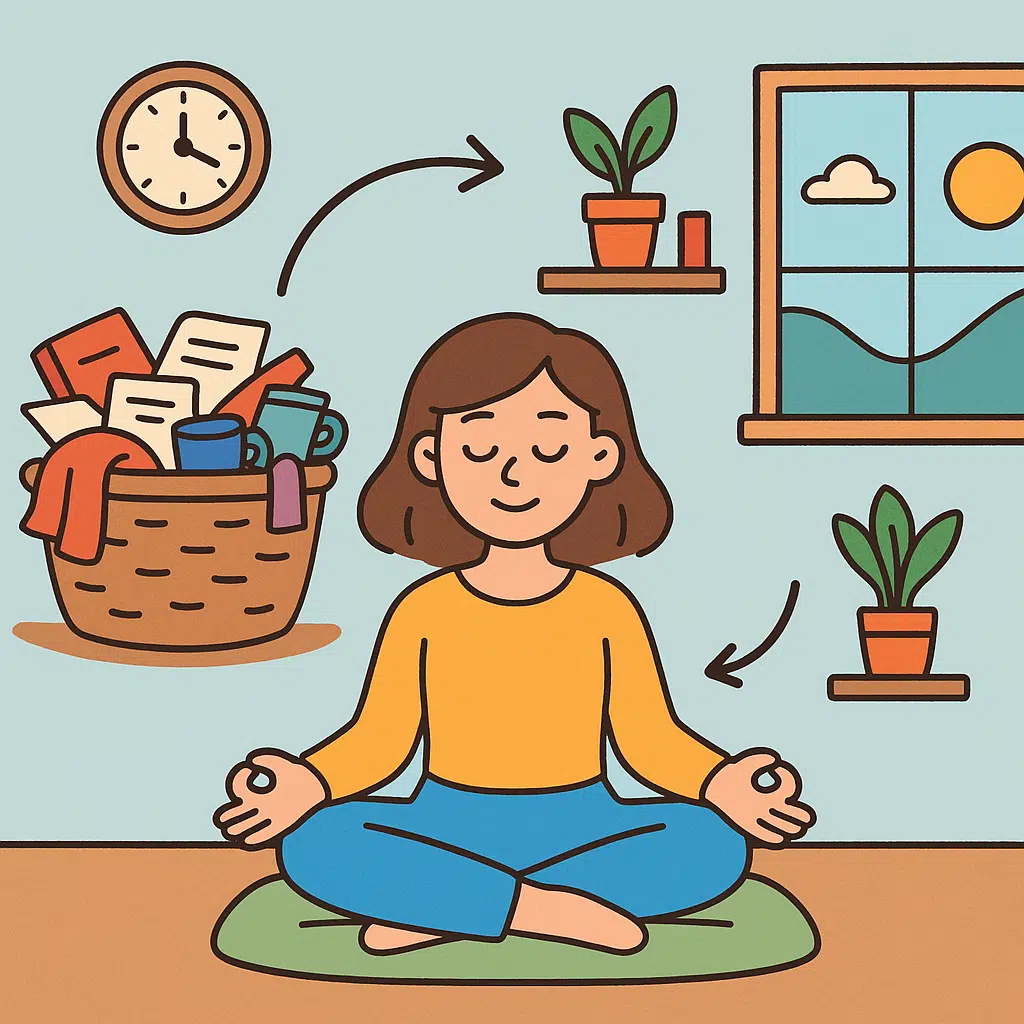How Simplifying Your Life Leads to More Peace and Focus
Charlotte Stone August 7, 2025
In the age of dopamine-chasing apps, overstuffed calendars, and that weird pressure to always be doing more, the phrase “less is more” isn’t just some minimalist motto. It’s survival advice.

“How to simplify your life” has become a hot topic for a reason. People are waking up to the fact that hustle culture is exhausting, not inspiring. We’re craving something different. Not just productivity—clarity. Not just efficiency—peace. And here’s the good news: simplifying your life might be the reset button your brain and your career both desperately need.
Why Life Feels So Overwhelming Right Now
Let’s be real. Modern life is a chaos buffet.
- Constant notifications keep your brain buzzing like a mosquito in a quiet room.
- Our homes are cluttered with forgotten subscriptions and items bought during retail therapy binges.
- Work bleeds into weekends thanks to “just one more email” and the curse of remote work boundaries.
This isn’t just annoying. It’s neurologically damaging. Research from Harvard Medical School shows that chronic multitasking reduces your brain’s capacity for deep focus and raises cortisol (the stress hormone) levels over time.
A cluttered life equals a cluttered mind. So what’s the antidote? Intentional simplicity.
The New Trend: Digital Minimalism and Lifestyle Decluttering
One of the hottest emerging trends right now is digital minimalism—a movement championed by authors like Cal Newport, which encourages intentional tech use. This isn’t about throwing your iPhone in a river. It’s about taking back control.
Similarly, lifestyle simplification—from capsule wardrobes to Swedish death cleaning (yes, it’s a thing)—is gaining steam on platforms like TikTok and YouTube. The #declutteryourlife hashtag has racked up millions of views. People are hungry for less.
And the benefits? Let’s break it down.
The Real Benefits of Simplifying Your Life
- More Peace: Simplicity creates breathing room. Fewer decisions, less chaos, and more mental white space.
- Better Focus: With fewer distractions, your brain can finally settle into deep work (hello, flow state!).
- Improved Productivity: Studies from Princeton Neuroscience Institute show that physical clutter competes for your attention, decreasing performance.
- Lower Anxiety: UCLA researchers found that cluttered environments trigger the stress hormone cortisol. Less stuff = less stress.
- More Time: When you stop overcommitting, overbuying, and overthinking, time magically appears.
So How Do You Actually Simplify?
Glad you asked. Here’s a step-by-step guide that doesn’t involve selling all your belongings and moving to a cabin in the woods (unless you want to, of course).
1. Audit Your Life Ruthlessly
Start by identifying the noise. What areas of your life feel heavy, cluttered, chaotic?
- Is it your digital life? (Too many tabs, notifications, subscriptions?)
- Your schedule? (Too many “yes” commitments?)
- Your home? (Piles of stuff that don’t spark joy… or anything?)
Write down the top five areas causing the most overwhelm. That’s your starting point.
2. Cut the Digital Fat
Let’s talk phones. Or rather, let’s talk about how they’re ruining your attention span.
- Turn off non-essential notifications (you don’t need a dopamine hit every time someone likes your tweet).
- Delete apps you haven’t used in a month.
- Try batching emails and messages into two or three time slots daily.
- Unfollow accounts that drain you. If it doesn’t educate, entertain, or uplift, it doesn’t need to be there.
If you’re feeling bold, consider a 7-day digital detox. Your brain will thank you.
“Minimalism is the intentional promotion of the things we most value and the removal of everything that distracts us from it.” – Joshua Becker, Becoming Minimalist
3. Simplify Your Space
You don’t need to be a Marie Kondo disciple, but reducing clutter helps you breathe better—literally and mentally.
- Start with one room. One drawer. One corner.
- Use the 90/90 Rule: If you haven’t used it in the last 90 days and won’t in the next 90, let it go.
- Label three bins: Keep, Donate, Trash.
Bonus tip: Make your space work for your goals. If you’re aiming for a productive career, create a workspace that supports deep focus (think less clutter, more lighting).
4. Say No Without the Guilt
A huge part of simplifying your life is learning that no is a complete sentence.
Stop overcommitting. Every “yes” to something unimportant is a “no” to what really matters.
- Use time-blocking to protect your focus time.
- Practice preemptive boundaries. Have scripts ready, like: “I can’t commit to that right now, but thank you.”
You don’t owe everyone your time. You owe yourself clarity.
5. Streamline Your Routines
Simplicity thrives in rhythm. Streamlined routines remove decision fatigue and build momentum.
- Morning Routine: Pick 3 things that energize you (e.g., journal, pray, stretch).
- Evening Routine: 3 things that calm you (e.g., tea, no screens, gratitude list).
- Work Routine: Batch tasks (emails in the morning, meetings in the afternoon).
Consistency, not complexity, is the secret sauce.
6. Create Margin (aka White Space for Your Brain)
Don’t fill every hour. Don’t scroll just because you’re bored. Build in mental whitespace.
- Go for walks without your phone.
- Leave some weekends plan-free.
- Do nothing for 10 minutes a day. Literally. Just sit.
This space isn’t laziness. It’s room for your mind to wander, reflect, and reset. Think of it as breathing room for your soul.
7. Prioritize What Actually Matters
Define your core values. What are the non-negotiables?
- Faith?
- Family?
- Creative work?
- Health?
Anything not aligned with those values? Move it down the list or off it completely.
As Greg McKeown puts it in Essentialism: “If you don’t prioritize your life, someone else will.”
8. Apply Simplicity at Work, Too
This isn’t just a personal thing. Simplifying your work life is a productivity game-changer.
- Use project management tools (Notion, Asana) to reduce mental clutter.
- Work in “focus sprints” (25-45 minutes of deep work, then break).
- Stop glorifying busyness. It’s not a badge of honor—it’s a red flag.
Fewer meetings, clearer goals, tighter workflows = more output and less burnout.
Simplifying Isn’t Always Easy—But It’s Worth It
Look, simplifying your life takes effort upfront. It means confronting some hard truths. Like, maybe your shopping habit is emotional. Maybe you say “yes” too much because you’re afraid of letting people down. Maybe you’re scared to slow down because you equate busyness with worth.
But here’s the truth: you don’t need more apps, more stuff, or more hustle. You need space. Focus. Rest.
The world doesn’t need a more exhausted version of you. It needs the clear, present, peaceful version.
Start today. One drawer. One app. One boundary at a time.
References
- Gregg, A. (2022). The Science of Simplicity: Why Less Is More for Your Brain. Psychology Today.
https://www.psychologytoday.com - Fumio, S. (2021). Why Simplifying Your Life Is the Key to Lasting Focus. The Guardian. https://www.theguardian.com/
- Johnson, L. (2023). Minimalism and Mental Health: How Decluttering Your Life Improves Emotional Wellbeing. Healthline. https://www.healthline.com







